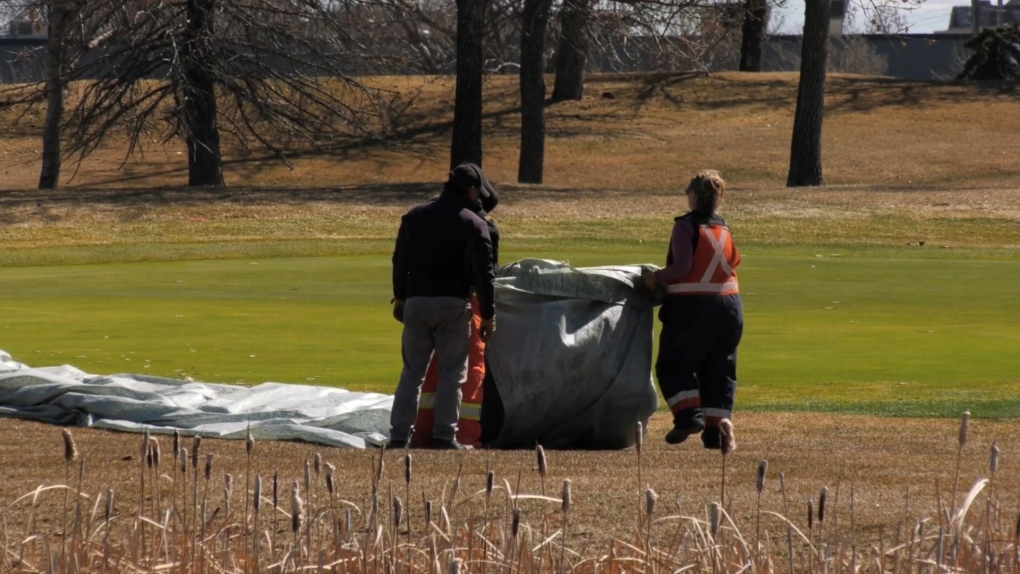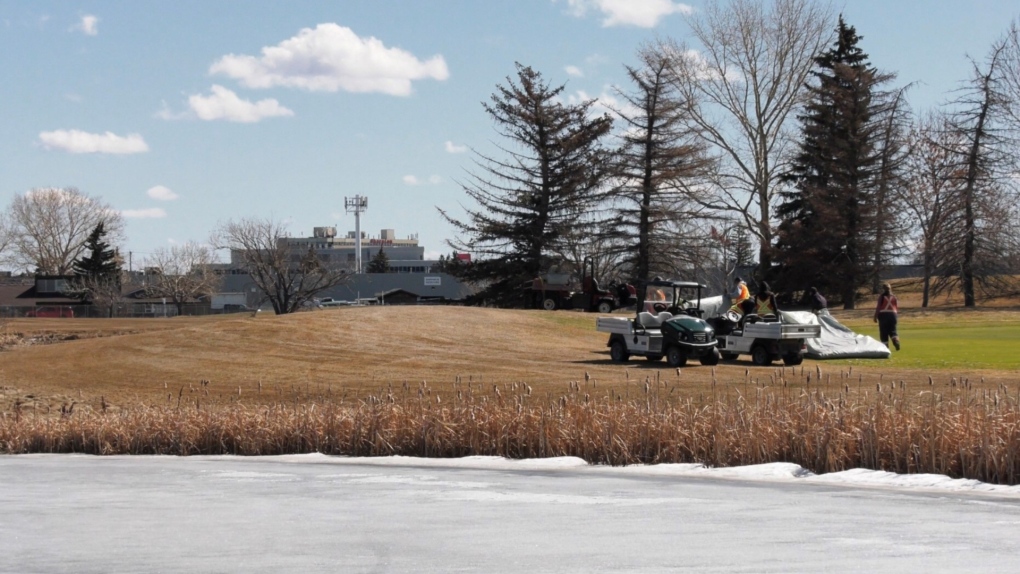Calgary golf courses prepare for potential water restrictions ahead of 2024 season
Though the City of Calgary plans to open up two of its public golf courses this week, officials say potential water restrictions are top of mind as the risk of drought conditions persists.
McCall Lake will open its 18-hole course and driving range on Friday, while Maple Ridge will also open its 18-hole-course on the same day, depending on the weather.
John Faber, golf lead for the City of Calgary golf operations, says his team has been working hard over the last couple of months to prepare for opening and determine how to manage water shortages or restrictions.
"As the water restrictions go through the different phases, we'll start to see irrigation of rough grass come offline, then we'll move into reducing the amount of irrigation on fairways, then to the tees," Faber said.
"Is it going to decrease the overall golfer experience? No. They're probably going to see some brown grass, things won't be as green as it would normally be, but the greens themselves, they are valued assets, so we will be watering them as required.
Faber notes that a lot of water technology, including the use of soil meters, is used to help determine how much water can be applied.
None of the City of Calgary courses use potable water, but other courses do rely on different water sources, including treated city water, to irrigate their playing surfaces.
 Tarps are lifted from the fairway at McCall Lake golf course on Wednesday, April 10, 2024.
Tarps are lifted from the fairway at McCall Lake golf course on Wednesday, April 10, 2024.
Blue Devil Golf Club, located in the city’s southeast, is set to open Thursday and sources its water through the Bow River through a water licence agreement with the province.
Slade King, chief operating officer for Play Golf Calgary, says his maintenance crews are adapting to concerns over potential water restrictions that could be in place as early as this May.
"We've spent the whole winter discussing and coming up with plans on different levels, depending on what the restriction is."
"We're going to manage that water for pesticide and chemical applications, even just playing conditions. You don't want it too wet, on your greens you want at a certain level kind of for growth and those types of things, you’re definitely not just putting out as much water as possible. There's a science to it, and less water is actually better."
King adds that some chemical applications on grass are also helping to reduce the amount of water needed.
"Those types of things will help you get that water deeper into the ground, and certain fertilizer practices have that grass healthy, so it can withhold some drought and could last a couple of weeks or a month with some water restrictions."
Calgary's water site management program
According to the City of Calgary, water restrictions could be in place as early as May 1.
The latest update from the city suggests that the Calgary region remains in a drought with dry conditions that have improved moderately since mid-winter.
Natural river flows remain low and reservoir storage in the Bow watersheds upstream from Calgary are average for this time of year, thanks to the investment of higher gates at the Glenmore Reservoir on the Elbow River.
The mountain snowpack has increased, but it’s still tending at below-average to average, which has prompted the city to create a special task force to update existing water managed sites programs.
 McCall Lake golf course is shown on April 10, 2024.
McCall Lake golf course is shown on April 10, 2024.
The Canadian Prairie Chapter of the Irrigation Association (CPCIA) approached the city and formed the task force to work with the city on updating the water managed sites program referenced under Schedule E of the Water Utility Bylaw.
"With the current possibility of water restrictions and this bylaw that’s so outdated, it has some serious if not devastating impacts on the irrigation and landscape industries in general," said CPCIA vice-president Aline Kahawaty.
Kahawaty says the CPCIA task force will be working on recommendations on the outdoor water use restrictions part of the bylaw update to manage water restrictions more effectively.
Currently, locations in the city that are not considered water managed sites must limit their watering to two hours per week if there are restrictions in place.
CPCIA is now recommending new technology changes for certain locations to qualify as water managed sites.
"If a site has an automatic irrigation system with smart water technologies such as flow or leak sensors, soil moisture sensors, weather or ET-based controllers, pressure regulating nozzles, etc. and if they complete and pass an irrigation system assessment and irrigation audit by a certified landscape irrigation auditor, they should be able to qualify and be certified," she said.
The full program details will be announced by the city around the end of April.
Meanwhile, other city contractor groups, like the Naiad Irrigation Systems, is working with residential homeowners and homeowners associations to help limit water usage through advanced technologies.
Myles Sidorak, CEO of the company, says his team of certified irrigation contractors are helping save water and money for Calgarians.
"We use technologies such as the Hunter Hydrawise timer that adjust runtimes depending on the time of year, so if it's really cool, it'll decrease the runtimes, but if it's really warm out, it'll increase runtimes," he said.
"In addition to that, as a contractor, we can access our client's portal and adjust the runtimes automatically, such as last July or August during the water restrictions. We were able to log on to our clients timers and set them as per the new City of Calgary water restrictions at that time."
CTVNews.ca Top Stories

Trump suggests the U.S. should take back the Panama Canal. Could they do that?
Donald Trump suggested Sunday that his new administration could try to regain control of the Panama Canal that the United States 'foolishly' ceded to its Central American ally, contending that shippers are charged 'ridiculous' fees to pass through the vital transportation channel linking the Atlantic and Pacific Oceans.
Man handed 5th distracted driving charge for using cellphone on Hwy. 417 in Ottawa
An Ottawa driver was charged for using a cellphone behind the wheel on Sunday, the fifth time he has faced distracted driving charges.
Wrongfully convicted N.B. man has mixed feelings since exoneration
Robert Mailman, 76, was exonerated on Jan. 4 of a 1983 murder for which he and his friend Walter Gillespie served lengthy prison terms.
What's open and closed over the holidays in Canada
As Canadians take time off to celebrate the holidays, many federal offices, stores and businesses will be closed across the country on Christmas Day and New Year's Day.
opinion Christmas movies for people who don't like Christmas movies
The holidays can bring up a whole gamut of emotions, not just love and goodwill. So CTV film critic Richard Crouse offers up a list of Christmas movies for people who might not enjoy traditional Christmas movies.
Can the Governor General do what Pierre Poilievre is asking? This expert says no
A historically difficult week for Prime Minister Justin Trudeau and his Liberal government ended with a renewed push from Conservative Leader Pierre Poilievre to topple this government – this time in the form a letter to the Governor General.
More than 7,000 Jeep SUVs recalled in Canada over camera display concern
A software issue potentially affecting the rearview camera display in select Jeep Wagoneer and Grand Cherokee models has prompted a recall of more than 7,000 vehicles.
'I'm still thinking pinch me': lost puppy reunited with family after five years
After almost five years of searching and never giving up hope, the Tuffin family received the best Christmas gift they could have hoped for: being reunited with their long-lost puppy.
10 hospitalized after carbon monoxide poisoning in Ottawa's east end
The Ottawa Police Service says ten people were taken to hospital, with one of them in life-threatening condition, after being exposed to carbon monoxide in the neighbourhood of Vanier on Sunday morning.

































